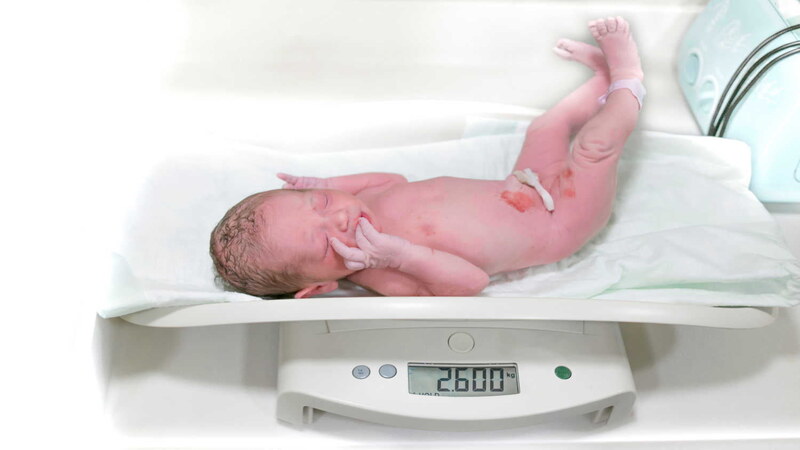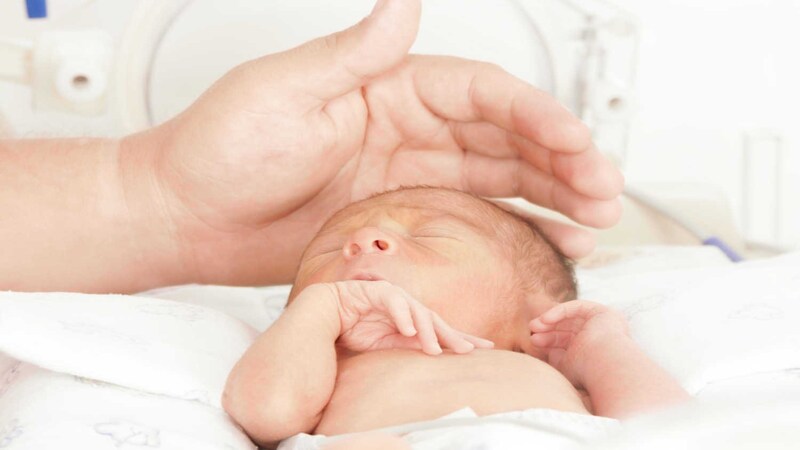
Low birth weight (LBW) in babies is a significant public health concern affecting millions of newborns worldwide. Defined as a birth weight of less than 2,500 grams, (1), low birth weight can result from premature birth, intrauterine growth restriction (IUGR), or being small for gestational age (SGA). Babies born with a low birth weight often face increased risks of health complications and may require specialized neonatal care to support their growth and development. Understanding the causes, risk factors, and preventive strategies for low birth weight is essential for ensuring healthier outcomes for both mother and child.
Here are a few additional factors regarding low-birth-weight babies and how parents can support and help their babies develop during the risk period.
What is Considered Low Birth Weight in Babies?
A baby whose birth weight is less than 2.5 kilograms is considered to have low birth weight. In India, around 12% of children had low birth weight and 18% were born prematurely between 2019 and 2021. (2). It is important to recognize that not all low birthweight babies have underlying medical conditions. Some babies are simply born smaller for no specific reason.
What is Extremely Low Birth Weight (ELBW)?
Extremely Low Birth Weight (ELBW) refers to infants who are born weighing less than 1,000 grams (approximately 2.2 pounds), regardless of their gestational age. These babies are typically born very prematurely, often before 28 weeks of pregnancy. They require intensive medical care in a Neonatal Intensive Care Unit (NICU) due to their high risk of complications.
How Does Low Birth Weight Affect My Baby?

In many instances, low birth weight may not affect your baby’s growth and development, particularly if the baby is born full-term and has no other health issues. However, if a baby is born prematurely or if a full-term baby has underlying medical conditions, low birth weight can elevate certain risks for your baby.
- Infections
- Jaundice
- Patent ductus arteriosus (PDA), a heart defect where two major heart vessels fail to close properly after birth, often resolves on its own within days.
- Polycythemia (blood thickening)
- Respiratory Distress Syndrome (RDS)
- Babies born before 34–36 weeks often struggle with feeding due to an underdeveloped sucking reflex, unlike those near normal birth weight. (3)
- Hypoglycemia
- Problems with the immune system
- Problems in lung function
- Low birth weight babies may also be at risk of hearing problems.
- Breathing problems
- Body temperature issues- the baby might not be keeping warm enough
- Slower rate of development
How severe these problems are depends on how low the birth weight is. It also depends on the cause of the low birth weight and the stage of pregnancy when growth restriction started.
Some people correlate low birth weight to lower intelligence and poor health, but there is no strong evidence to prove these myths.
3 Important Facts About Ideal Weight in Infants
As a parent, you would always want to know and understand the important facts about your baby’s ideal weight at birth and how it should increase as they grow. Here are some tidbits for you.
- In the first three to four days after birth, a baby typically loses about 7% to 10% of their body weight. (4) However, this loss is usually regained by the end of the second week. After six months of breastfeeding, a baby generally gains at least two pounds each month.
- The weight of newborn babies increases by two times once they reach their 4th month. After twelve months, that is, after or around the first birthday, you can expect their weight to triple their birth weight.
- In the first two years of life, a baby’s growth is rapid, which can result in fluctuations in their ideal weight. After 24 months, growth stabilizes, and the baby will begin to gain weight at a steady pace.
Top Causes of Low Birth Weight in Babies

The cause of the low birth weight in your child is more important than the actual weight itself. This is because the cause determines your baby’s health as he grows up. The following are the top 12 causes of low birth weight in children:
1. Preterm birth
If your baby is born before 37 weeks of gestation, then they will most likely be underweight.
2. Multiple Pregnancies
If you are carrying multiple gestations, such as twins, triplets, or more, you have a higher chance of giving birth to babies who weigh less than the ideal 2.5 kg (5). This is because a greater number of babies are competing for space and nutrition inside the uterus.
3. Intrauterine Growth Restriction (IUGR)
These babies are born full-term but are still considered “small for gestational age.” They are likely healthy, especially if their lower birth weight is due to genetics. There are two types of IUGR.
a. Asymmetrical IUGR
This occurs due to malnutrition or high blood pressure in mothers. The baby may have disproportionately low fetal measurements, and the body size could be smaller compared to the head size.
b. Symmetrical IUGR
This type of intrauterine growth restriction (IUGR) occurs due to factors such as intrauterine infections, chromosomal abnormalities, and the mother’s lifestyle choices, like alcohol abuse. In this condition, the baby grows slowly during pregnancy and remains consistently below the ideal weight range. Babies with IUGR are more likely to experience health problems throughout their lives.
4. High Blood Pressure in Mother
If the mother has high BP, then the blood flow to the baby from the placenta is impacted, resulting in low birth weight
5. Substance Abuse by The mother
If a mother smokes, uses illegal drugs, or consumes alcohol during pregnancy, it can hinder the baby’s growth and affect their weight. These substances can pass through the placenta to the baby, leading to health issues, including low birth weight.
6. Placenta-related Problems
If the mother experiences placenta-related issues, such as pre-eclampsia or placenta previa, the blood and nutrient flow to the baby may be affected, leading to lower birth weight.
7. Diabetes
Diabetes can result in a larger baby, but it may also lead to preterm birth, which affects the baby’s weight.
8. Uterus Abnormalities
Sometimes the baby cannot grow big due to the restrictions imposed by the uterus, such as fibroids and uterine malfunctions.
9. Cervix Abnormalities
If a mother has cervical abnormalities, it can lead to low birth weight. An incompetent cervix may cause a premature delivery, as it begins to open under pressure as the baby grows. In many cases, a cerclage, which is a stitch placed in the cervix, is used, and the mother is often advised to have complete bed rest.
10. Mother’s Nutrition During Pregnancy
If the mother has not gained enough weight during pregnancy due to malnutrition or an imbalanced diet, it can affect the baby’s weight. A baby needs a constant supply of nutrients to grow and develop, and the mother’s diet is the primary source of nutrition for her. Not eating a balanced and healthy diet can increase the chances of having a low birthweight baby
11. Infections During Pregnancy
Infections and the drugs used to fight infections during pregnancy can impact a baby’s weight gain.
Read more on infections during pregnancy here
12. Previous Birthing History
Prior preterm deliveries or low birth weight deliveries will increase the probability of a subsequent low birth weight delivery.
Top Factors That Affect Ideal Weight in Infants

There are many factors that contribute to low birth weight of a baby as mentioned below.
1. Inherited Medical Conditions
A baby can inherit potential hereditary diseases in the womb itself, and this may lead to having a low birth-weight baby.
2. Term Completion
Pre-term babies and pre-mature babies are mostly born underweight. This is because the baby did not develop fully in the womb, and since babies put on weight only during the later stages of pregnancy, this stage gets missed.
3. Genetics
The mother’s weight does affect the baby’s birth weight, but the father’s weight also plays a role. Genetics contributes to the baby’s birth weight, meaning that some babies may be small because that trait runs in the family.
4. Age at Conception
For all we know, women after the age of 35 tend to have larger babies. Teen pregnancies generally produce underweight babies.
5. Pre-pregnancy Weight
A BMI less than 19 is likely to account for a low-weight baby, whereas a BMI greater than 24 risks the delivery weight of the baby being quite large.
6. Multiple Births
In the case of multiple births, such as twins, triplets, or more, babies often have less space and fewer nutrients to grow because they share the same uterus and placenta (in many cases). This limited environment can restrict their growth, making them smaller compared to single-born babies. Additionally, multiple births are more likely to result in premature delivery, which also contributes to lower birth weights.
7. Poor Diet During Pregnancy
Following a poor or unbalanced diet during pregnancy can prevent the baby from getting the essential nutrients needed for proper growth and development. Key nutrients like protein, iron, folic acid, calcium, and vitamins are vital for building healthy tissues, organs, and overall fetal growth. If the mother’s diet lacks these nutrients, it can lead to complications such as low birth weight, premature birth, or developmental delays. That’s why incorporating a well-balanced diet rich in fruits, vegetables, whole grains, lean proteins, and prenatal vitamins is crucial to support both the mother’s health and the baby’s ideal weight at birth.
8. Smooth Pregnancy
A smooth and trouble-free pregnancy results in the delivery of babies of optimum weight. Complications during pregnancy can affect the ideal weight of the baby.
9. Medical Issues Before or During Pregnancy
Any sort of medical problems that occur in the fetus during pregnancy can affect the weight of the infant. Pre-pregnancy conditions like anemia, diabetes, renal conditions, etc., also put the baby at risk of being born underweight. (6)
10 Placental Problems
Conditions like pre-eclampsia can reduce the blood supply to the baby, thus restricting the baby’s growth in the womb. Such babies are usually born low weight because of a deficiency in nutrients and oxygen in the womb.
11. Mother’s Health
If the mother has any unhealthy habits, such as drinking and smoking, it may lead to reduced birth weight of the baby.
12. Gender of The Baby
Slight differences in weight may be observed based on the baby’s gender, with girls typically being smaller and boys usually being heavier.
How Can I Help My Baby Overcome Low Birth Weight?

It’s important to consider the factors that may have contributed to your baby’s low birth weight before drawing any conclusions. Breastfeeding is one of the most effective steps you can take to ensure your baby’s healthy growth and development. Additionally, providing a nutritious diet, along with family support, love, care, and compassion, will significantly benefit your little one as they grow. However, as your baby develops, be sure to monitor their weight. Some premature babies may gain weight quickly and could be at risk of developing obesity.
Some tips that may help you cope with your low birthweight baby are:
1. Breastfeeding
The best way to nourish and nurture your baby is to breastfeed them as much as they want. Breast milk is the perfect food for your little one to gain weight and be healthy, though sometimes the doctor may prescribe some vitamins and minerals as well.
2. Co-sleeping With Your Baby
Co-sleeping and skin-to-skin contact with your baby would aid in the development of the baby
Click here to read about precautions to take when co-sleeping with your newborn.
3. Regular Monitoring
You need to closely monitor your low-birth baby, and reach your doctor if you feel that the baby is developing jaundice, fever, or irregular or laborious breathing
4. Regular Doctor Visits
Low-birth babies need to be vaccinated on time and so regular it is necessary that you visit the doctor well in time. This will also enable to check the baby’s development and growth on a regular basis
5. Limit Visitors
Low birth weight babies have an underdeveloped immune system, hence avoid visitors who are battling an infection, howsoever minor it may sound
6. Be patient
Your baby might be kept in NICU initially to help regulate baby’s body temperature. Be patient and positive during this period
7. Healthy Weight Gain
It might be tempting to give your baby artificial and refined food to help them gain weight quicker. This might not be a good idea. Stick to breastfeeding or formula feeding in the initial 6 months. Even after introducing solid foods, ensure you give nutritious and balanced home-cooked food rather than store-brought cereals that can do more harm than good
If you are pregnant and worried about low birth weight, there are quite a few things that you can do during pregnancy to reduce the risk of a low birthweight baby. These include good and early prenatal care, a balanced and nutritious diet, folic acid supplements and regular health checkups.
To sum it up, it is extremely important to consider the ideal weight for infants seriously as it is a vital indicator of underlying health problems in your little ones. If you want to track the weight gain of your baby, you can follow the baby weight chart which is prepared by pediatricians. Proper diet and regular check-up facilitate ideal weight gain in infants.
FAQ’s
1. What Causes Low Birth Weight in Babies?
Premature births are one of the most common causes of low birth weight in babies. Other causes can include the mother’s health during pregnancy, diet habits, drugs and medications used, family history of low birth weight, genetics, etc.
2. Do Low-Birth-Weight Babies Survive?
The survival of low birth weight babies depends on the weight at birth and the complications associated with the childbirth. Babies with a weight of less than 500 g are associated with the highest medical complications and the lowest chances of survival.
Reference
- Cutland CL, Lackritz EM, Mallett-Moore T, Bardají A, Chandrasekaran R, Lahariya C, Nisar MI, Tapia MD, Pathirana J, Kochhar S, Muñoz FM; Brighton Collaboration Low Birth Weight Working Group. Low birth weight: Case definition & guidelines for data collection, analysis, and presentation of maternal immunization safety data – https://pmc.ncbi.nlm.nih.gov/articles/PMC5710991/
- Jana A. Correlates of low birth weight and preterm birth in India. PLoS One. 2023 Aug 17;18(8):e0287919. – https://pmc.ncbi.nlm.nih.gov/articles/PMC10434923/
- Kamity R, Kapavarapu PK, Chandel A. Feeding Problems and Long-Term Outcomes in Preterm Infants-A Systematic Approach to Evaluation and Management – https://pmc.ncbi.nlm.nih.gov/articles/PMC8700416/
- NICE Guideline, No. 75, National Guideline Alliance (UK). London: National Institute for Health and Care Excellence (NICE); 2017 Sep – https://www.ncbi.nlm.nih.gov/books/NBK536449/
- Louis G. Keith, MD, PhD Professor, Department of Obstetrics and Gynecology, Northwestern University Medical School, Chicago, Illinois – https://www.glowm.com/section-view/heading/Higher-Order%20Multiple%20Gestations/item/141
- Singh G, Chouhan R, Sidhu K. Maternal Factors for Low Birth Weight Babies. Med J Armed Forces India. 2009 Jan;65(1):10-2 – https://pmc.ncbi.nlm.nih.gov/articles/PMC4921448/
